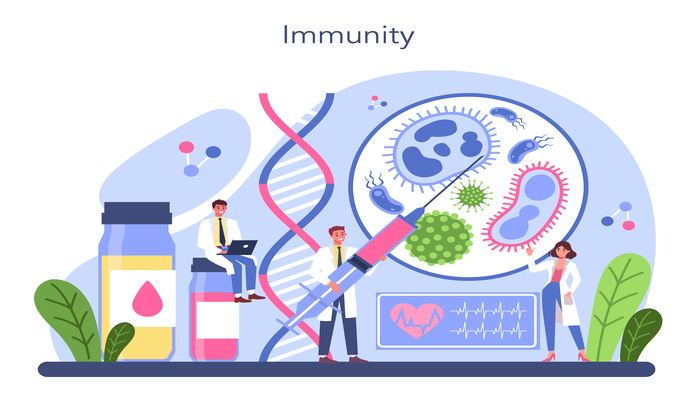- Immunology is the study of how the body reacts to foreign substances and fights infections and other diseases. Immunologists study the molecules, cells, and organs of the human body that participate in this reaction.
- Immunology is the branch of biomedical science that studies the structure and function of the immune system.
- Immunology deals with the study of immunity and immune systems of vertebrates.
- The primary goal of immunology is to understand how the immune system recognizes and reacts to foreign substances, known as antigens, as well as differentiate them from the body’s cells. The immune system has a remarkable ability to identify and neutralize a wide variety of pathogens and plays a vital role in maintaining overall health.
History of Immunology
-Metchnikoff (1845-1916)
- Metchnikoff is the Russian zoologist. He discovered the importance of cells in immunity and phagocytosis.
-Emil von Behring (1854-1917)
- The greatest support for humoral theory came from the studies of Behring, a German bacteriologist.
- In 1890, he showed that it was possible to provide an animal with passive immunity against tetanus or lockjaw by injecting into it the blood serum of another animal infected with tetanus.
-Alexander Fleming (1881-1955)
- Fleming a British bacteriologist received the Nobel prize in 1945 for his discovery of penicillin.
- He discovered the antibiotic lysozyme.
Immunity
Immunity is the state of being able to resist a particular disease by preventing the growth of pathogenic microorganisms or counteracting the effects of its products.
Innate immunity is already present in the body, Innate immunity is an immediate, non-specific defence mechanism that an organism has from birth. It acts as the first line of defence against a wide range of pathogens, including bacteria, viruses, fungi and parasites.
Adaptive immunity is an immunity that occurs after exposure to an antigen either from a pathogen or a vaccination. This part of the immune system is activated when the innate immune response is insufficient to control an infection.

Immune System
The immune system is a complex network of cells, tissues, and organs that work together to defend the body against harmful invaders, such as pathogens (microorganisms such as bacteria, viruses, fungi, and parasites). It is the job of the immune system to recognize these agents as foreign and destroy them.
Antibodies and Antigens
Antibodies, also called immunoglobulins, are proteins produced by the immune system in response to the presence of foreign substances called antigens. There are five different types of antibodies, each with a different Y-shaped configuration and function. They are Ig G, A, M, D and E antibodies.
B-Cells (B lymphocytes)
B lymphocytes, cells that produce antibodies, originate and mature in the bone marrow. Thus, B lymphocytes now refer to bone marrow-derived lymphocytes.
T-Cells (T lymphocytes)
T lymphocytes, mediators of cellular immunity, originate in the bone marrow, and migrate and mature in the thymus; T lymphocytes refer to thymus-derived lymphocytes.
Hypersensitivity
Hypersensitivity refers to an abnormal response of the immune system to a substance that is usually harmless to most people. This increased immune response can lead to a variety of symptoms and conditions, ranging from mild irritation to severe and life-threatening reactions. This is an abnormal state of the immune response that has harmful effects on the host.
Autoimmunity
Autoimmunity is a condition in which the immune system, which is designed to protect the body from harmful invaders such as bacteria and viruses, mistakenly targets and attacks the body’s tissues. Normally, the immune system can distinguish between the body’s cells and foreign invaders, but in autoimmune diseases, this recognition breaks down, leading to an immune response against the body’s cells and tissues.
Autoimmunity is involved in a variety of unrelated diseases such as systemic lupus erythematosus (SLE), insulin-dependent diabetes mellitus (IDDM), myasthenia gravis, rheumatoid arthritis, multiple sclerosis, and hemolytic anaemia.
References
- https://www.immunology.org/public-information/what-immunology
- https://www.sciencedirect.com/topics/medicine-and-dentistry/immunology
- https://www.news-medical.net/health/What-is-Immunology.aspx
- https://journals.aai.org/jimmunol
- https://www.hindawi.com/journals/jir/